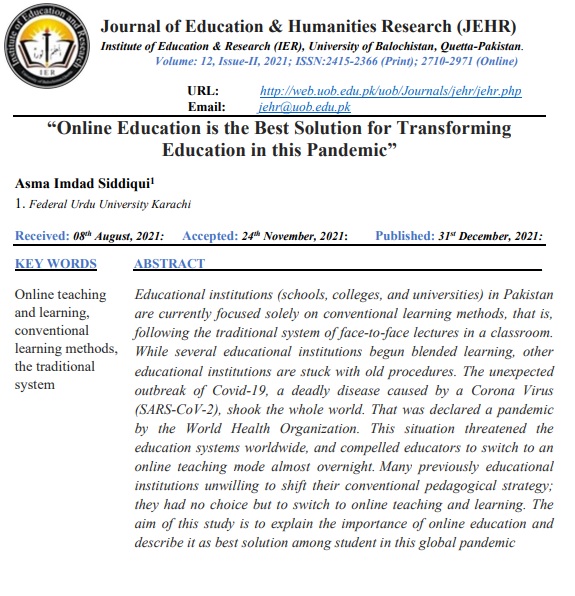Online Education is the Best Solution for Transforming Education in this Pandemic
Keywords:
Online teaching and learning, conventional learning methods, the traditional systemAbstract
Educational institutions (schools, colleges, and universities) in Pakistan are currently focused solely on conventional learning methods, that is, following the traditional system of face-to - face lectures in a classroom. While several academic units have now begun blended learning, several of them still remain stuck with old procedures.
The unexpected outbreak of Covid-19, a deadly disease caused by a Corona Virus (SARS-CoV-2), shook the whole world. That was declared a pandemic by the World Health Organization. This situation threatened the worldwide education system, and compelled educators to switch overnight to an online teaching mode.
Many previously unwilling academic institutions to shift their conventional pedagogical strategy had no choice but to turn completely to online teaching – learning. The aim of this study is to explain the importance of online education and describe it as best solution among student in this global pandemic.
References
Rieley, J. B. (2020). Corona Virus and its impact on higher education. Research Gate.
Google Scholar
McBrien, J. L., Cheng, R., Jones, P. (2009). Virtual spaces: Employing a synchronous online classroom to facilitate student engagement in online learning. The International Review of Research in Open and Distributed Learning, 10(3), 1–17.
Google Scholar | Crossruff
Cojocariu, V.-M., Lazar, I., Nedeff, V., Lazar, G. (2014). SWOT analysis of e-learning educational services from the perspective of their beneficiaries. Procedia-Social and Behavioral Sciences, 116, 1999–2003.
Google Scholar
Carey, K. (2020). Is everybody ready for the big migration to online college? Actually, no. The New York Times. https://www.nytimes.com Google Scholar
Liguori, E. W., Winkler, C. (2020). From offline to online: Challenges and opportunities for entrepreneurship education following the COVID-19 pandemic. Entrepreneurship Education and Pedagogy. https://doi.org/10.1177/2515127420916738 Google Scholar
Ayebi-Arthur, K. (2017). E-learning, resilience, and change in higher education: Helping a university cope after a natural disaster. E-Learning and Digital Media, 14(5), 259–274. https://doi.org/10.1177/2042753017751712
Google Scholar | SAGE Journals
Todorova, N., Bjorn-Andersen, N. (2011). University learning in times of crisis: The role of IT. Accounting Education, 20(6), 597–599. https://doi.org/10.1080/09639284.2011.632913 Google Scholar
Seville, E., Hawker, C., Lyttle, J. (2012). Resilience tested: A year and a half of ten thousand aftershocks. University of Canterbury. Google Scholar
Huang, R. H., Liu, D. J., Tlili, A., Yang, J. F., Wang, H. H., Zhang, M., Lu, H., Gao, B., Cai, Z., Liu, M., Cheng, W., Cheng, Q., Yin, X., Zhuang, R., Berrada, K., Burgos, D., Chan, C., Chen, N. S., Cui, W., Hu, X. , et al. (2020). Handbook on facilitating flexible learning during educational disruption: The Chinese experience in maintaining undisrupted learning in COVID-19 outbreak. Smart Learning Institute of Beijing Normal University. Google Scholar
Tull, S. P. C., Dibner, N., Ayebi-Arthur, K. (2017). Social media and e-learning in response to seismic events: Resilient practices. Journal of Open, Flexible and Distance Learning, 21(1), 63–76. Google Scholar




